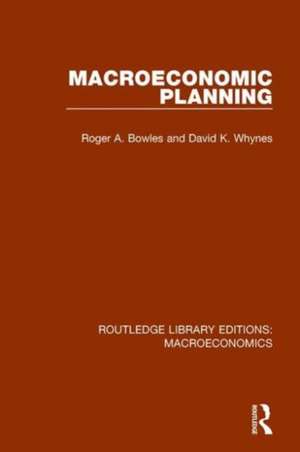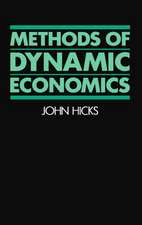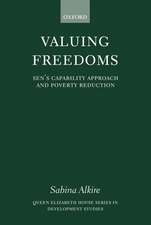Macroeconomic Planning: Routledge Library Editions: Macroeconomics
Autor Roger Bowles, David Whynesen Limba Engleză Hardback – 15 sep 2015
Firstly, the authors establish why societies feel a need for government control and examine the mechanisms by which such social decisions are reached. Next they examine the nature of economic data, the modelling of economic systems nad a review of practical policy goals and instruments. The book then reviews the basic theory of optimisation and elaborates it in the context of planning for growth, for stabilisation and under uncertainty. It closes with an analysis of practical planning based on French and Soviet experience.
| Toate formatele și edițiile | Preț | Express |
|---|---|---|
| Paperback (1) | 241.15 lei 6-8 săpt. | |
| Taylor & Francis – 3 aug 2017 | 241.15 lei 6-8 săpt. | |
| Hardback (1) | 1000.27 lei 6-8 săpt. | |
| Taylor & Francis – 15 sep 2015 | 1000.27 lei 6-8 săpt. |
Preț: 1000.27 lei
Preț vechi: 1219.84 lei
-18% Nou
Puncte Express: 1500
Preț estimativ în valută:
191.42€ • 199.60$ • 159.09£
191.42€ • 199.60$ • 159.09£
Carte tipărită la comandă
Livrare economică 21 martie-04 aprilie
Preluare comenzi: 021 569.72.76
Specificații
ISBN-13: 9781138938410
ISBN-10: 1138938416
Pagini: 214
Dimensiuni: 156 x 234 mm
Greutate: 0.45 kg
Ediția:1
Editura: Taylor & Francis
Colecția Routledge
Seria Routledge Library Editions: Macroeconomics
Locul publicării:Oxford, United Kingdom
ISBN-10: 1138938416
Pagini: 214
Dimensiuni: 156 x 234 mm
Greutate: 0.45 kg
Ediția:1
Editura: Taylor & Francis
Colecția Routledge
Seria Routledge Library Editions: Macroeconomics
Locul publicării:Oxford, United Kingdom
Public țintă
General, Postgraduate, Professional, and UndergraduateCuprins
1. Macroeconomics and Planning 2. The Need for Planning 3. The Derivation of Planning Objectives 4. The Nature of the Economy 5. Optimisation 6. Planning in Practice 7. Conclusions.
Descriere
This volume, originally published in 1979, examines systematically the nature of control in both capitalist and socialist economies, develops a theoretical and applied framework which can embrace both macroeconomics and plannng and demonstates the essential unity of all forms of macroeconomic planning by the consistent application of basic economic principles.




























